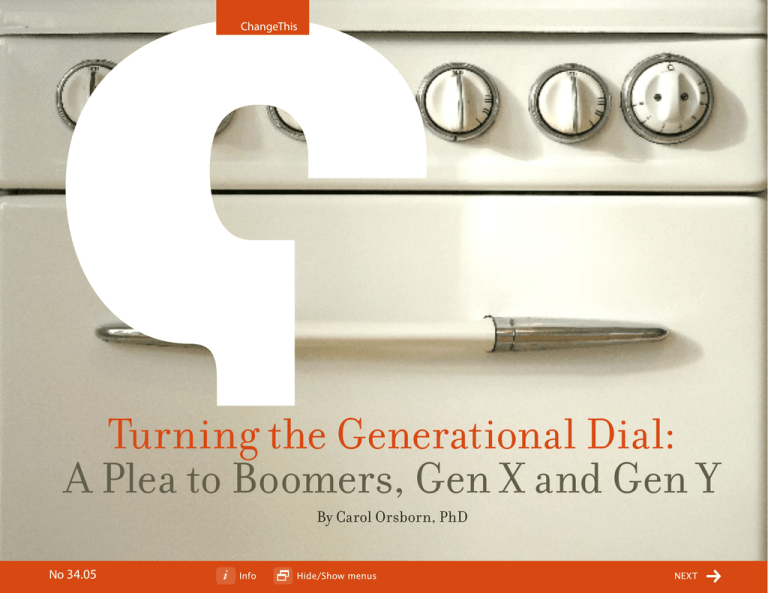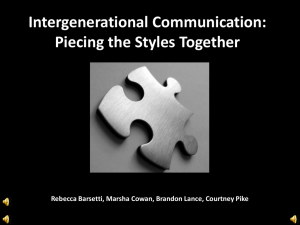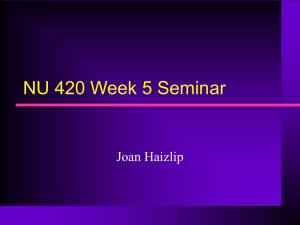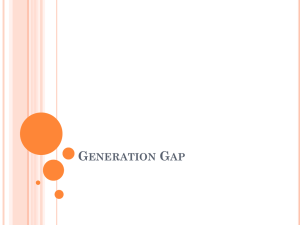Turning the Generational Dial: By Carol Orsborn, PhD
advertisement

ChangeThis Turning the Generational Dial: A Plea to Boomers, Gen X and Gen Y By Carol Orsborn, PhD No 34.05 Info Hide/Show menus next ChangeThis When I was a marketer in my 30’s, the thought never occurred to me (or to any of my similarly-aged clients, for that matter) to target “old” people. That was the 80’s, and one of the telling highlights of my early career was when I was part of the team that retired Italian Swiss Colony’s Little Old Winemaker to make the rejuvenated Colony Wine the yuppy drink de jour. There was no discussion by marketers or the media about people 40-plus as a market force. They were off the radar screen—powerless, invisible. But times have changed. When baby boomers turned 60 one year ago and didn’t fade from the mainstream, it made headline news. Now “older” consumers between 43–61 have been rediscovered by the mainstream marketplace—driven by numbers too big and active to be ignored as potential consumers, and it’s making some of today’s 20– and 30–somethings understandably nervous. When will this most self-centered generation in history step aside and give us our turn? If anything, the boomers’ power seems to be increasing. They’re everywhere—running major tech firms, hanging on to their positions at the top of organizational pyramids and running for president. No wonder the younger generations are increasingly anxious. Take a recent article by Alessandra Stanley in the New York Times, titled “Reality Check for a Generation that Knows Best.” Stanley makes a passionate protest against the boomers’ dominance of culture, reality shows, in particular, citing “American Idol” and “The Apprentice,” where boomer judges pass judgment upon the young contestants. They “may not be the greatest generation, but baby boomers are the bossiest and most imposing, and they have a way of muscling their way past young upstarts and innovators,” Stanley writes. No 34.05 Info /8 ChangeThis You may be surprised to hear me, a boomer myself, tell you that pinning this issue on a generationwide character flaw—namely boomers on selfishness, bossiness and greed—is a natural, even healthy, response by the younger generations who are attempting to fulfill their potential. But it is also misguided. The real issue is that this is the first time in history that a generation has passed through their child-bearing years having raised adult children ready to take their place in society, yet retained enough of what society still needs to remain power players themselves. At 78 million strong, boomers outnumber and outspend the 50 million Gen X’ers and 70 million Gen Y’ers and, with an AARP study finding that as many as 8 out of 10 boomers don’t plan to retire, it’s clear that we are all in uncharted terrain. This is the first time in our history when multiple generations are simultaneously competent to handle the business of running our society. In brief, this is the first time in our history where multiple generations are simultaneously competent to handle the business of running our society. This is, in part, because of medical advances that have given older folks twenty or thirty extra years of genuine vitality, and partly because western civilization has become brain rather than brawn-driven. In fact, facing a demographic dip in the generation that follows the boomers, companies in countries like the US, Canada and Japan—just to name a few—are retaining experts to convince boomers to stay on the job as long as possible… or, at least until the equally large echo boomer generation gains enough experience and knowledge to fill the need. The fact that boomers are hitting 60 and not fading away is a phenomenon to which all the generations need to adjust. No 34.05 Info /8 ChangeThis This phenomenon is so new and poorly understood, in fact, that the college texts about adult development seem to bolster the boomer character flaw thesis. Recall, for instance, psycho-social theorist Erik Erikson’s eighth and highest stage of the life cycle. Erikson taught that the highest stage of adult development occurred when the elder steps aside to mentor the next generation. Post midlife crisis or menopause, the man or woman at 50 or 60 and beyond could either look forward to a slow, sad decline, or, at best, a gracious surrender to a serene but marginalized old age. In either case, their turn was to be over by the switch of the generational dial. Erikson called this “generativity.” What most people don’t know is that late in life, Erikson revised his eight stages to add a ninth. In his eighties, still skipping forward rather than stepping aside, he came to realize that adult development is not something that screeches to a halt midlife, but is a life-long affair. For boomers and generations to come, the implications are enormous, as we all adjust to this new reality. This is not as simple as Stanley’s citation of Cowell’s rejection of idol aspirants to be “a symbolic reenactment of an inter-era struggle in which the bullies always come out on top.” Here are a few important points to consider: 1. It’s misguided to blame boomers’ continuing dominance as stemming from selfishness. As a generation, boomers lost our innocence with the assassination of JFK and the revelations surrounding Watergate. We were the first generation to lose faith in the paternalistic promises of institutional life. We could not trust others to take care of us and so we turned our focus back towards ourselves. This so-called self-centeredness is not the character flaw some would charge but rather, a by-product of a historical moment—a healthy life-giving and society-changing response to circumstances that were not of our doing. If, in some instances, it has gone to the extreme, this is just the pendulum swinging—as it does with all corrective measures— back towards a new and growing concern about giving back to others in the form of legacy. No 34.05 Info /8 ChangeThis 2. The lifespan has elongated the life cycle for all the generations. Many Gen X’ers and Y’ers are putting off the notion of marrying and parenting into their 30’s and 40’s. Separation from parents—both emotionally and financially—is happening later, as well. Isn’t it logical that many boomers would also, as studies show, believe themselves to have not yet reached their financial and career peak? 3. Boomers have suddenly found themselves to be the “cool generation.” Marketers certainly think so. In a recent television commercial for yogurt, you hear women’s voices exclaiming enthusiastically about turning “The Big 6-0.” The camera pans back and the audience is shocked—these women are not aging boomers but rather in their 20’s and 30’s. The big 6-0 they’re referring to is the 60 calories in the single-serving of yogurt. But the implied message is this: it’s cool to be 60. In fact, it’s surprising and wonderful when anybody in any context defies the stereotypes, especially when for the marketers and other cultural tastemakers (including those in their 20’s or 30’s) defying the stereotypes can prove to be lucrative for their employers, advertisers and clients, and great for their careers. At the same time, who’s to blame boomers for being flattered by all this attention? 4. Nobody is more surprised to still be in the limelight than the boomers themselves. Partly given our twenty or thirty extra years of genuine vitality, partly because western civilization has become brain rather than brawn-driven, and partly because we don’t have enough money to retire, we couldn’t be excused from a place at the generational table, even if we tried. What is most hopeful is that there are organizations—both in the profit and not-for-profit sectors— where leading and trailing edge boomers, Gen X’ers, and Gen Y’ers are all learning to work together. Fleishman-Hillard is one such place. In our marketing-to-boomer practice—the first by a global PR firm dedicated to helping companies build relationships with the boomer generation—we have Gen X’ers who blog regularly on our website (www.TheBoomerBlog.com), echo boomers who participate and lead in creative and strategic decisions and Gen Y’ers who share the pioneering spirit of helping our clients tap into this lucrative, previously uncharted territory. No 34.05 Info /8 ChangeThis The truth is that the generational dial will flip to a new channel soon enough. At FH Boom, as well as many of our client companies, we have seen that younger generations can applaud boomers blazing social change for older workers in our workplaces, especially if the boomers are creative at providing opportunities for continued growth and increasing the power of the individuals on their teams. The call for boomers in management should not be to give away their power—but rather, to use their power to grow the opportunities for the next generation. It is no accident that smart boomers in the c-suite—not to mention boards and investors—are beginning to pay special attention to succession strategy. The truth is that the generational dial will flip to a new channel soon enough. And when it does, there will be something society has never before witnessed: generations in power who will not have grown into adulthood anticipating the marginalized, invisible, powerless future boomers once expected to have—but rather, the promise of lifelong vitality, relevant entertainment and the thriving careers at midlife and beyond that boomers pioneered. No 34.05 Info /8 ChangeThis info About the Author Carol Orsborn, Ph.D., a leading edge baby boomer, is the author of 15 books on the boomer generation and co-chair of Fleishman-Hillard’s FH Boom practice. Recently, she co-authored Boom: Marketing to the Ultimate Power Consumer—the Baby Boomer Woman (Amacom Books, by Mary Brown and Carol Orsborn, Ph.D.) She is chief blogger at www.TheBoomerBlog.com Contact Carol at Carol.Orsborn@Fleishman.com download this This manifesto is available from http://changethis.com/34.05.Generational buy the book send this For more details or to buy a copy of Carol Orsborn’s Boom click here. Click here to pass along a copy of this manifesto to others. http://changethis.com/34.05.Generational/email Subscribe Learn about our latest manifestos as soon as they are available. Sign up for our free newsletter and be notified by email. http://changethis.com/subscribe Born on date This document was created on May 9, 2007 and is based on the best information available at that time. To check for updates, please click here to visit http://changethis.com/34.05.Generational. No 34.05 Info /8 ChangeThis info ABOUT CHANGETHIS ChangeThis is a vehicle, not a publisher. We make it easy for big ideas to spread. While the authors we work with are responsible for their own work, they don’t necessarily agree with everything available in ChangeThis format. But you knew that already. ChangeThis is supported by the love and tender care of 800-CEO-READ. Visit us at our main site www.800ceoread.com or at our daily blog http://800ceoread.com/blog/. Copyright info The copyright in this work belongs to the author, who is solely responsible for the content. This work is licensed under the Creative Commons Attribution-NonCommercial-NoDerivs License. To view a copy of this license, visit http://creativecommons.org/licenses/by-nc-nd/2.0/ or send a letter to Creative Commons, 559 Nathan Abbott Way, Stanford, California 94305, USA. Cover image from http://www.istockphoto.com. WHAT YOU CAN DO You are given the unlimited right to print this manifesto and to distribute it electronically (via email, your website, or any other means). You can print out pages and put them in your favorite coffee shop’s windows or your doctor’s waiting room. You can transcribe the author’s words onto the sidewalk, or you can hand out copies to everyone you meet. You may not alter this manifesto in any way, though, and you may not charge for it. No 34.05 Info /8







